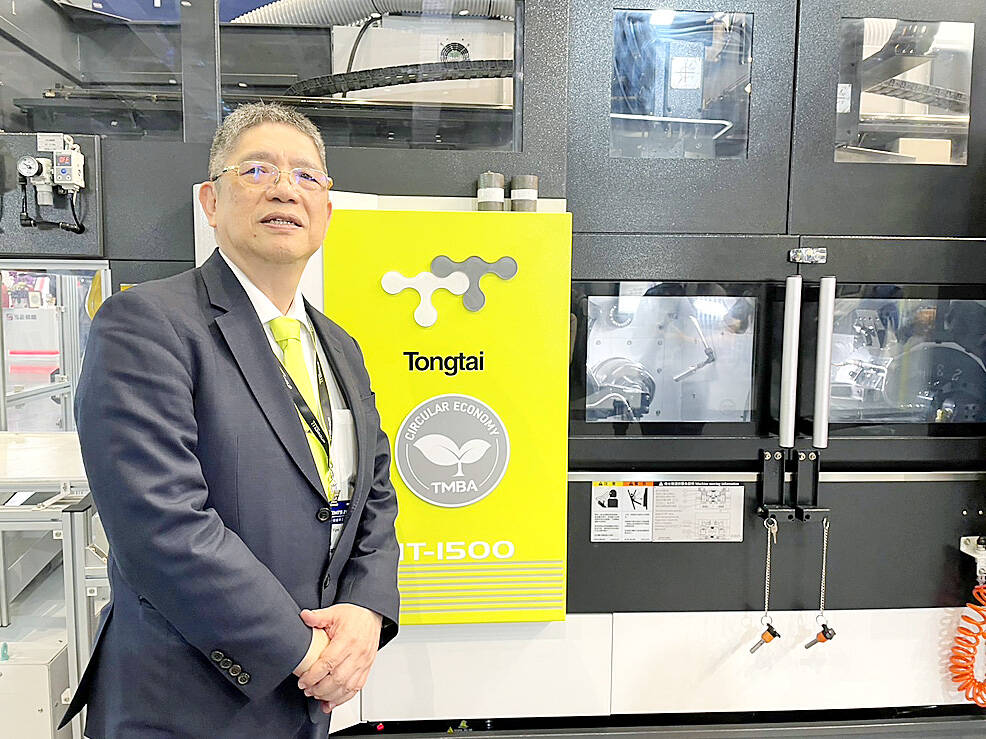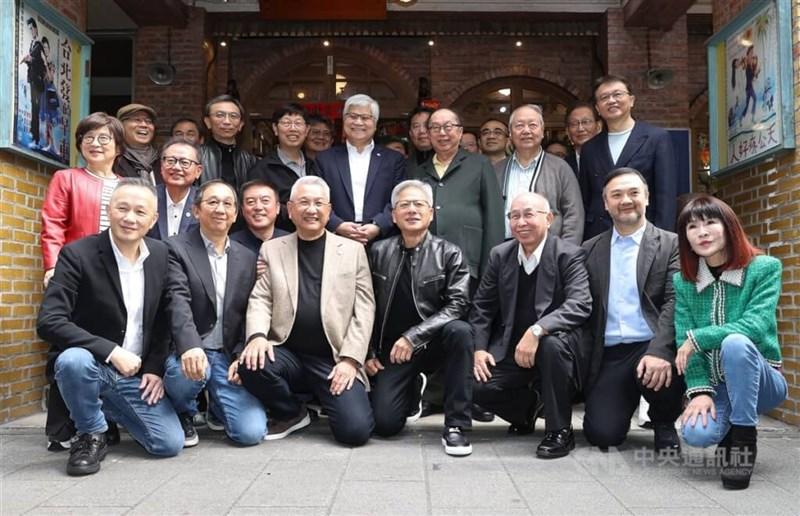Taiwanese manufacturers have a chance to play a key role in the humanoid robot supply chain, Tongtai Machine and Tool Co (東台精機) chairman Yen Jui-hsiung (嚴瑞雄) said yesterday.
That is because Taiwanese companies are capable of making key parts needed for humanoid robots to move, such as harmonic drives and planetary gearboxes, Yen said.
This ability to produce these key elements could help Taiwanese manufacturers “become part of the US supply chain,” he added.

Photo: CNA
Yen made the remarks a day after Nvidia Corp cofounder and chief executive officer Jensen Huang (黃仁勳) said his company and Taiwan Semiconductor Manufacturing Co (TSMC, 台積電) are jointly creating new opportunities in areas such as robotics and self-driving cars.
However, the biggest obstacle to making humanoid robots more widely available is the high cost, said the head of Tongtai Machine, a major machine tool manufacturer based in Kaohsiung.
The current unit cost of humanoid robots is so high that it effectively adds “an extra zero” to the target price, Yen said.

Photo: CNA
However, “reducing the cost of humanoid robots presents an opportunity for Taiwanese key component manufacturers to play a crucial role,” he added.
Huang concluded his three-day “pop-up” visit to Taiwan yesterday. One day earlier, he hosted a luncheon to treat the high-ranking management of his company’s supply chain partners in Taiwan, including TSMC chairman C.C. Wei (魏哲家), Hon Hai Precision Industry Co (鴻海) chairman Young Liu (劉揚偉) and Quanta Computer Inc (廣達) chairman Barry Lam (林百里).
Other big names included Asustek Computer Inc (華碩) chairman Johnny Shih (施崇棠), Pegatron Corp (和碩) chairman Tung Tzu-hsien (童子賢), Siliconware Precision Industries Co (矽品) chairman Tsai Chi-wen (蔡其文), Acer Inc (宏碁) chairman Jason Chen (陳俊聖), Wistron Corp (緯創) chairman Simon Lin (林憲銘) and Inventec Corp (英業達) chairman Sam Yeh (葉力誠).
Huang is upbeat about the prospects of robotics development. He previously revealed that the US-based artificial intelligence (AI) chip designer is actively investing in three major robotics hardware and software solutions: Agent AI, humanoid robots and autonomous vehicles.
In his keynote speech at the Consumer Electronics Show (CES) in Las Vegas earlier this month, Huang showed off the next-generation Thor Blackwell Robotics Processor, which can be used in automated handling machines and humanoid robots.
Tesla Inc cofounder and CEO Elon Musk announced during the CES that the electric car maker plans to produce 50,000 to 100,000 Optimus humanoid robots by next year, with a goal of expanding production to at least an annual output of 500,000 units by 2027.

In Italy’s storied gold-making hubs, jewelers are reworking their designs to trim gold content as they race to blunt the effect of record prices and appeal to shoppers watching their budgets. Gold prices hit a record high on Thursday, surging near US$5,600 an ounce, more than double a year ago as geopolitical concerns and jitters over trade pushed investors toward the safe-haven asset. The rally is putting undue pressure on small artisans as they face mounting demands from customers, including international brands, to produce cheaper items, from signature pieces to wedding rings, according to interviews with four independent jewelers in Italy’s main

Japanese Prime Minister Sanae Takaichi has talked up the benefits of a weaker yen in a campaign speech, adopting a tone at odds with her finance ministry, which has refused to rule out any options to counter excessive foreign exchange volatility. Takaichi later softened her stance, saying she did not have a preference for the yen’s direction. “People say the weak yen is bad right now, but for export industries, it’s a major opportunity,” Takaichi said on Saturday at a rally for Liberal Democratic Party candidate Daishiro Yamagiwa in Kanagawa Prefecture ahead of a snap election on Sunday. “Whether it’s selling food or

CONCERNS: Tech companies investing in AI businesses that purchase their products have raised questions among investors that they are artificially propping up demand Nvidia Corp chief executive officer Jensen Huang (黃仁勳) on Saturday said that the company would be participating in OpenAI’s latest funding round, describing it as potentially “the largest investment we’ve ever made.” “We will invest a great deal of money,” Huang told reporters while visiting Taipei. “I believe in OpenAI. The work that they do is incredible. They’re one of the most consequential companies of our time.” Huang did not say exactly how much Nvidia might contribute, but described the investment as “huge.” “Let Sam announce how much he’s going to raise — it’s for him to decide,” Huang said, referring to OpenAI

The global server market is expected to grow 12.8 percent annually this year, with artificial intelligence (AI) servers projected to account for 16.5 percent, driven by continued investment in AI infrastructure by major cloud service providers (CSPs), market researcher TrendForce Corp (集邦科技) said yesterday. Global AI server shipments this year are expected to increase 28 percent year-on-year to more than 2.7 million units, driven by sustained demand from CSPs and government sovereign cloud projects, TrendForce analyst Frank Kung (龔明德) told the Taipei Times. Demand for GPU-based AI servers, including Nvidia Corp’s GB and Vera Rubin rack systems, is expected to remain high,